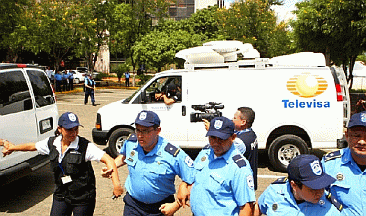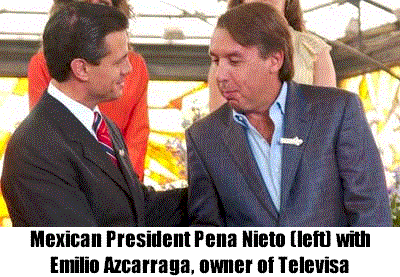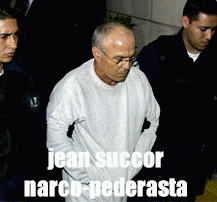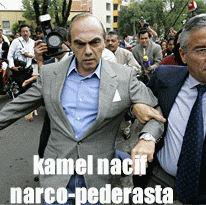Three Mexican journalists—each a woman who has spent years living with the real possibility that the death threats she regularly receives will one day result in a slow, gruesome death—heroically continue to report the truth about the drug war in their country that no mainstream American journalist has the balls to report about the drug war in ours:
“Mexico’s war on drugs is one big lie.”
Carmen Aristegui (above,left) Lydia Cacho (above, center) and Anabel Hernández(above, right) report Mexico’s drug lords and the Mexican government are two sides of the same coin. Each has more courage in her little finger than do hundreds of toadies, lapdogs, and sniveling careerists in the U.S. mindlessly passing along press releases fed to them by government handlers as news.
Que es mas macho?
Even as the U.S. mainstream media continues to parrot the latest “still winning hearts and minds” banalities from DEA spokesmen peddling the longest and costliest war (40 years at $40 billion per year) America has ever fought, a handful of brave Mexican journalists have been reporting the convergence between drug cartels, assisted by that country’s leading industrialists, and their partners at giant U.S. and UK “too big to fail” banks.
It should go without saying—but does not—that the same can be said for the U.S.
Paging Gary Webb, white courtesy telephone
 When border guards in Nicaragua busted 18 Mexicans—17 men and one woman, wearing Televisa t-shirts and traveling in six satellite TV vans emblazoned with the Televisa logo while carrying press credentials from the network— it became clear some powerful entity was running a drug and money-laundering service.
When border guards in Nicaragua busted 18 Mexicans—17 men and one woman, wearing Televisa t-shirts and traveling in six satellite TV vans emblazoned with the Televisa logo while carrying press credentials from the network— it became clear some powerful entity was running a drug and money-laundering service.
In the weeks following the big bust, Mexican journalist Carmen Aristegui developed information that the Televisa employees had been running their drug and money laundering pipeline up and down the length of Central America for five years. Without anyone noticing.
Why it was invisible quickly became obvious. After the scandal broke Mexican reporters were bullied—thank god just in print—to leave the Narco-Televisa scandal alone. Reporting anything clearly violated the impunity Mexican oligarchs have come to believe is their due.
 Controversy was raging over the refusal of Mexico’s Attorney General to investigate connections between the 18 Mexican Televisa employees, busted for carrying $9.2 million in drug money, and their bosses at Latin America’s largest TV network, including owner Emilio Azcarraga, the power behind the throne of Mexico’s new President Enrique Peña Nieto.
Controversy was raging over the refusal of Mexico’s Attorney General to investigate connections between the 18 Mexican Televisa employees, busted for carrying $9.2 million in drug money, and their bosses at Latin America’s largest TV network, including owner Emilio Azcarraga, the power behind the throne of Mexico’s new President Enrique Peña Nieto.
Reporter Carmen Aristegui stood accused of being a “manipulative freak” who is “sickly obsessed.” She has a “communication strategy Nazi propaganda minister Joseph Goebbels would have loved.”
In the columns of unfriendly Mexican journalists, she was said to share (with Proceso magazine) a “fixation.” She suffered from a “Fatal Obsession.” She engaged in “pure unsubstantiated sensationalism,” hoping that by “repeating a lie a certain number of times it would become the truth.”
Her reporting on the “Cocaine Caravan” scandal was called “an incredible waste of resources, both financial and human.” “Yet Aristegui persists in disguising her obsession with famous phrases like ‘the public interest’ and ‘questions that deserve answers.’”
Pooh-poohing the deep doo-doo
 Not to be outdone, the Western World’s mainstream media jumped in with both feet. Not to investigate. To pooh-pooh the story.
Not to be outdone, the Western World’s mainstream media jumped in with both feet. Not to investigate. To pooh-pooh the story.
A US reporter stationed in Mexico City called it—while providing no evidence to back the claim—the “fake journalists” scandal. FOX NEWS said the 18 Mexicans comprised a “phony news crew.” Reuters reported the Mexicans were merely “posing as journalists.”
Not to be outdone, the Associated Press used the incident to cast a gimlet eye on the post-Sandinista government of Nicaragua.
“Big cash seizure puts light on Nicaragua drug role” read the headline over the AP account. The seizure “pulled back the curtain on Nicaragua’s role as a (drug) conduit” said London’s Telegraph.
Reporter Tim Johnson, stationed in Mexico City for McClatchy Newspapers, allowed that the Nicaragua drug case was “vexing Televisa.”
BBC News pointed out that “2012 has not been a good year for the largest television producer in the Hispanic world.”
Cooler heads observed that Carmen Aristegui is the recipient—on four separate occasions—of Mexico’s National Journalism Award, and has been awarded the Cabot Prize from Columbia University’s Graduate School of Journalism.
Poignantly, in a radio interview at the height of the vilification, she plaintively cried “I want to live!”
Even more poignantly, she lost her job.
The Narco-Pederastas
 Lydia Cacho, Mexico’s best-known journalist and human rights campaigner, endured a prolonged ordeal that began with a terrifying 36-hour drive from her home in the coastal state of Quintana Roo to courthouse and jail in another state, during which she had been sexually violated, threatened with death and “disappearance”, and horribly intimidated.
Lydia Cacho, Mexico’s best-known journalist and human rights campaigner, endured a prolonged ordeal that began with a terrifying 36-hour drive from her home in the coastal state of Quintana Roo to courthouse and jail in another state, during which she had been sexually violated, threatened with death and “disappearance”, and horribly intimidated.
Cacho was to be charged with libel after the publication of a book, The Demons of Eden, which revealed a sex-trafficking and pedophile ring with connections to power on high, implicating two powerful Lebanese businessmen living in Cancun, Kamel Nacif and Jean Succor, widely reported to be major figures in the dominant drug cartel in the Yucatan.
The Narco-Pederastas link to seizure of American planes
The men were at the heart of a scandal involving a huge child molestation ring which provided children as young as five to a clientele of wealthy Mexican and foreign businessmen.
Cacho was eventually vindicated by subsequent events and trials which demonstrated demonstrates that the pederasts were being protected by the governor of Puebla state, by the judiciary and by people even higher up—all of whom had strong ties to the drug trade.
At a press conference after the crash of the American-registered DC-9 seized with 5.5 tons of cocaine aboard, Mexican Attorney General Daniel Cabeza de Vaca had stated officials from Federal security agencies in the Yucatan were known to be in collusion with drug traffickers. With his next breath he mentioned Kamel Nacif, 69, the same Lebanese businessman in Cancun linked to an international network of pedophiles.
Drug War in the Yucatan
 Nacif and Kamel were involved in the drug war pitting two cartels vying for dominance in the Yucatan. One result was the seizure of two American-registered airplanes carrying a total of ten tons of cocaine, both of whom had paid off the losing cartel for permission to land.
Nacif and Kamel were involved in the drug war pitting two cartels vying for dominance in the Yucatan. One result was the seizure of two American-registered airplanes carrying a total of ten tons of cocaine, both of whom had paid off the losing cartel for permission to land.
The scandal, which has been profiled in dozens of stories in this space, had several strong resonances in Venice, Florida. First, the DC-9 had belonged to SkyWay Aviation, one of whose principals, Frederic Geffon, used an address at the Venice Airport.
But the Lebanese narco-pederastas had an even stronger link to the Venice Airport, at 4Square Aviation, so named because one of the owners was a pastor at Jerry Falwell’s Thomas Road Baptist Church in Lynchburg Virginia.

There one could prepare for the fires of damnation by renting a biblically-inerrant Gulfstream.
“Pastor” Wayne Booth was also Chairman of the Endowment Fund at Falwell’s Liberty University, meaning he’s good at raising money. This was good, because while Falwell was still alive—as we saw in stories of Wally Hilliard’s million dollar loan to him— Jerry always needed money.
Jerry Falwell and…REDACTED?
4Square was managed by Iran-Contra veteran Joe Duncan, whose other partner, REDACTED, lived in a $5 million estate in West Palm Beach.
 REDACTED took frequent business trips to Panama with Mario Villanueva, the then fugitive Governor of Quintana Roo, who was wanted for drug trafficking and money laundering, and who was eventually extradited to the U.S.
REDACTED took frequent business trips to Panama with Mario Villanueva, the then fugitive Governor of Quintana Roo, who was wanted for drug trafficking and money laundering, and who was eventually extradited to the U.S.
The state of Quintana Roo, where the resorts of Cancun and Cozumel are located, was ruled by a vicious—even by Mexican standards—cabal of Mexican-Lebanese drug traffickers and known pedophiles, led by Kamel Nacif and Jean Succor.
Based on a tip in 2004 from the FBI, which had been conducting surveillance of REDACTED, the Drug Enforcement Administration (DEA) searched REDACTED’S private plane, a Jetstar II, which he had acquired through Duncan Aviation at the Venice Airport.
 Agents discovered such an embarrassing large pile of cash and bonds on the plane that The State Department felt compelled to request Panama to ask REDACTED to resign his position.
Agents discovered such an embarrassing large pile of cash and bonds on the plane that The State Department felt compelled to request Panama to ask REDACTED to resign his position.
REDACTED was forced to turn in his diplomatic pouch, which presumably put a sizable crimp in his disposable income.
REDACTED and one of Jerry Falwell’s Pastors made for an extremely odd couple.
“The War on Drugs is a Sham”
 Anabel Hernández, journalist and author, accuses the Mexican state of complicity with the cartels, and says the ‘war on drugs’ is a sham. For her pains, she’s had headless animals left at her door and her family have been threatened by gunmen.
Anabel Hernández, journalist and author, accuses the Mexican state of complicity with the cartels, and says the ‘war on drugs’ is a sham. For her pains, she’s had headless animals left at her door and her family have been threatened by gunmen.
Hernandez’s offence was to write a book, Narcoland: The Mexican Drug Lords and their Godfathers, about the drug cartels that have wrought carnage across Mexico.
There have been other books about the relentless violence; what made Narcoland different was that it links the syndicate responsible for much of the violence – the Sinaloa cartel—with the leadership of the Mexican state. It became a runaway bestseller, selling more than 100,000 copies in Mexico, a staggering figure for a non-fiction book in a country with levels of income and literacy which don’t compare to the American market.
Hernandez’s book has now been published in English.
The interest delivers a clear message, Hernández told The Guardian newspaper. “So many Mexicans do not believe the official version of this war. They do not believe the government are good guys, fighting the cartels. They know the government is lying.”
 At first, I thought it would be difficult,” she says. “I didn’t think people would be ready to believe that the government is lying. That this is all one big lie.”
At first, I thought it would be difficult,” she says. “I didn’t think people would be ready to believe that the government is lying. That this is all one big lie.”
The book shows that the received wisdom in the English-speaking world contaminates coverage of the “war on drugs. ” It talks about “cops versus robbers” and “upright society versus the mafia.” And its a lie.
“Narcoland shows how contemporary capitalism is in no position to renounce the mafia,” wrote one reviewer. “Because it is not the mafia that has transformed itself into a modern capitalist enterprise, it is capitalism that has transformed itself into a mafia. The rules of drug trafficking that Anabel Hernández describes are also the rules of capitalism.”
Before Mexico’s drug war erupted, Hernandez had been honored by UNICEF for her work on slave labor and the exploitation of Mexican girls entrapped in agricultural work camps in southern California.
Does ‘Shorty’ really run the world’s biggest business?
 Then she turned her attention to the most perilous of subjects in Mexico, the powerful men involved in the drug trade, especially Joaquin “El Chapo'” Guzmán, leader of the Sinaloa cartel. Guzmán did not “escape” from Puente Grande, she reports, as the lore has it, in a laundry truck. He walked free in a police uniform, with a police escort.
Then she turned her attention to the most perilous of subjects in Mexico, the powerful men involved in the drug trade, especially Joaquin “El Chapo'” Guzmán, leader of the Sinaloa cartel. Guzmán did not “escape” from Puente Grande, she reports, as the lore has it, in a laundry truck. He walked free in a police uniform, with a police escort.
“I began receiving information in documents and testimony in the U.S. courts and interviews I did with drug traffickers that the Sinaloa cartel enjoyed government protection since the Vicente Fox administration, and that protection continued through the government of Felipe Calderón,” writes Hernandez.
“So I starting doing public information requests in Mexico to see if these things being said in [the U.S.] courts were true. What I found was that during Felipe Calderón’s so-called drug war, the cartel that was attacked the least, that had the fewest arrests, was the Sinaloa cartel.”
 “Throughout the Felipe Calderón administration’s six years, government statistics show there were increases in marijuana production, increases in opium production, increases in amphetamine production, and increases in drug consumption in Mexico.”
“Throughout the Felipe Calderón administration’s six years, government statistics show there were increases in marijuana production, increases in opium production, increases in amphetamine production, and increases in drug consumption in Mexico.”
She asks, “What kind of drug war is this where a cartel gets stronger and becomes the most powerful cartel in the world, as drug production reaches historic levels in Mexico?”
She also touches on the history of the drug trade’s partnership with the Mexican government. The old Guadalajara cartel of the 1980s was protected by the PRI; just as its heir, Guzmán’s Sinaloa syndicate, is now.
They shoot journalists dont they?
 The pogrom against the press is no “sideshow” or media obsession with itself – it is strategically integral to Mexico’s drug war, and the taking of territory by the cartels.
The pogrom against the press is no “sideshow” or media obsession with itself – it is strategically integral to Mexico’s drug war, and the taking of territory by the cartels.
“The silencing of the press and killing of journalists is integral to the reality, the big story, of what is happening here,” explains Mike O’Connor from the Committee to Protect Journalists.
The release last month of former cartel boss Rafael Caro Quintero by a Mexican federal court made headlines across the world; Quintero had been convicted of a part in the torture to death of a US Drug Enforcement Administration agent, Enrique “Kiki” Camarena in 1985. It’s a murder which, in Hernandez’s account, throws light on both Mexican government and CIA complicity in drug trafficking, a narrative that exposes a deep root of the present drug war.
The court released Quintero on a legal technicality, but Hernández says, “Mexico’s government did nothing to prevent it. They contributed cover for it. One thing nobody wants is Quintero talking about the roles of the Institutional Revolutionary Party [returned to power, and in government during Cam arena’s murder] and the CIA in the origins of Chapo Guzmán’s cartel.”
Generation Quisling
 Anyone who at one time read each weekly issue of The New Yorker with a grateful sigh that somewhere civilization still existed will be horrified to learn that the magazine’s editors have turned over coverage of the drug war (at least this week) to a man whose principal credential is as the author of a “book” entitled “A Million First Dates.”
Anyone who at one time read each weekly issue of The New Yorker with a grateful sigh that somewhere civilization still existed will be horrified to learn that the magazine’s editors have turned over coverage of the drug war (at least this week) to a man whose principal credential is as the author of a “book” entitled “A Million First Dates.”
In “The Missing Story of the Drug War” in the Sept 17 New Yorker, Dan Slater does his best to live down to his dubious pedigree, calling prominent books about drug cartels “flyover books with little firsthand reporting.”
His shockingly-uninformed-especially-in-this-day-and-age argument is an elaborate retelling of one of the principal lies of the Drug War: That drug cartels achieve traction during moments when the CIA is “looking the other way.”
 “Back then,” Slater writes, “the war on drugs, despite all of Washington’s lip service, was a secondary concern. Foremost on Washington’s mind was fighting Communist insurgencies in Latin America. Thus the CIA needed its base in Mexico City, which meant accommodating Mexico’s Federal Security Directorate, a criminal incubator.”
“Back then,” Slater writes, “the war on drugs, despite all of Washington’s lip service, was a secondary concern. Foremost on Washington’s mind was fighting Communist insurgencies in Latin America. Thus the CIA needed its base in Mexico City, which meant accommodating Mexico’s Federal Security Directorate, a criminal incubator.”
Besides, “many of Mexico’s most notorious traffickers come out of the country’s labyrinthine security and law-enforcement establishment anyway: the police, Army, Navy, and special-force troops.”
Slater makes no mention of prominent Mexican “businessmen” like Carlos Slim or Hank Rhon. And the names of recent Mexican Presidents? Nope, even though every recent Mexican President—including Carlos Salinas, Vicente Fox, Felipe Calderon, and Enrique Pena—have presided over that country’s drug trade, just as prominent American political leaders do here in the U.S. How could it be otherwise?
“A couple of decades ago, it wouldn’t have been possible for an upstart group to wage war, take over a few cities, and develop a cartel without high-level federal government connections,” Slater reports. “Today, in a void of central authority, evil moves through the poor communities of a narco state with a cancerous gravity, making every cell sick.”
What piffle. It must have been more than obvious to New Yorker editors that a man who boasts at his online website of covering topics for magazines like women who sell Caddies, artists who stuff their cats and turn them into helicopters, and online-dating mavens was the perfect choice to opine about the state of journalistic coverage of the drug war.
Right.
Nothing borrowed, nothing gained
 In this, he resembles fellow ‘Gen Q’ writer Evan Wright, whose “American Desperado,” an as-told-to book about supposed Medellin cartel transportation boss Jon Roberts, repeats the big lie that the Medellin Cartel was responsible for the assassination of Barry Seal.
In this, he resembles fellow ‘Gen Q’ writer Evan Wright, whose “American Desperado,” an as-told-to book about supposed Medellin cartel transportation boss Jon Roberts, repeats the big lie that the Medellin Cartel was responsible for the assassination of Barry Seal.
Wright was only too happy to borrow—without attribution—evidence in Barry & ‘the boys’” detailing my discovery of Barry Seal’s CIA recruitment while a member of the Louisiana Civil Air Patrol, where he met both Lee Harvey Oswald and Kennedy assassination factotum David Ferrie.
Wright was also only too happy to borrow—again from “”Barry & ‘the boys,” and again without attribution—my discovery of the now-famous nightclub picture taken in Mexico City in 1963 showing Seal sitting next to a man who would later become George W. Bush’s head of the CIA, Porter Goss.
 While his “borrowings” were convincing evidence of his familiarity with my work, he either suddenly developed scruples—highly unlikely—or cold feet, a more convincing scenario, when it came time to man up and tell the truth about the assassination of Barry Seal.
While his “borrowings” were convincing evidence of his familiarity with my work, he either suddenly developed scruples—highly unlikely—or cold feet, a more convincing scenario, when it came time to man up and tell the truth about the assassination of Barry Seal.When he instead repeats the canard (read: Big Lie) that Seal was murdered by the Medellin Cartel, it is safe to assume the mistake is not one of ignorance, but design.
And the Mighty Wurlitzer plays on.








So Barry Seal was running drugs for the Democrats? And the Democrats favor ending (parts of) Prohibition? That says they now have other sources of money the Republicans don't have. And the political divide is obvious. The left rank and file favors ending Prohibition more than the right rank and file. Those Baptists are in bed with the bootleggers again.
The Republican stance generally is 10th Amendment. Leave it to the States. No mention of repealing Federal law.
What are the main themes of the anti-Prohibitionists? Prisons, Racism, Medical Use.
Re: the link Cassie October 19, 2015 at 8:17 pm posted. It can also be found here:
https://medium.com/@MexConex/a-hastert-moment-for-hillary-bubba-jeb-obama-and-kerry-26897fafbd17#.x7jzwy4p3
I found that with this search term: " Giffuni drug "
Chiris Christie's Mexico visit (referenced in the letter) is a fact. Christie is a drug warrior. And how about that Bernie Sanders? I'm no friend of his politics but he is working hard to put anothe nail in the coffin of Prohibition.
I have a question. What is going on (drug war) has to be known to other intel services. Why haven't they blown the whistle? I am familiar with such half arsed efforts as Lyndon LaRouche (Russia I believe). Is that the best they can do?
Daniel,
wordpress doesn't let you see the email address on comments.
My version of wordpress allows that. I sometimes contact commenters that way.
This might be something you'd find interesting: http://www.twitlonger.com/show/n_1snmakv?new_post=true
Dear Daniel,
Roger Reaves book will be out soon.
Could you please make contact via – rogerreaves2015@gmail.com – or preferably at the email provided that is not published in the identifier line.